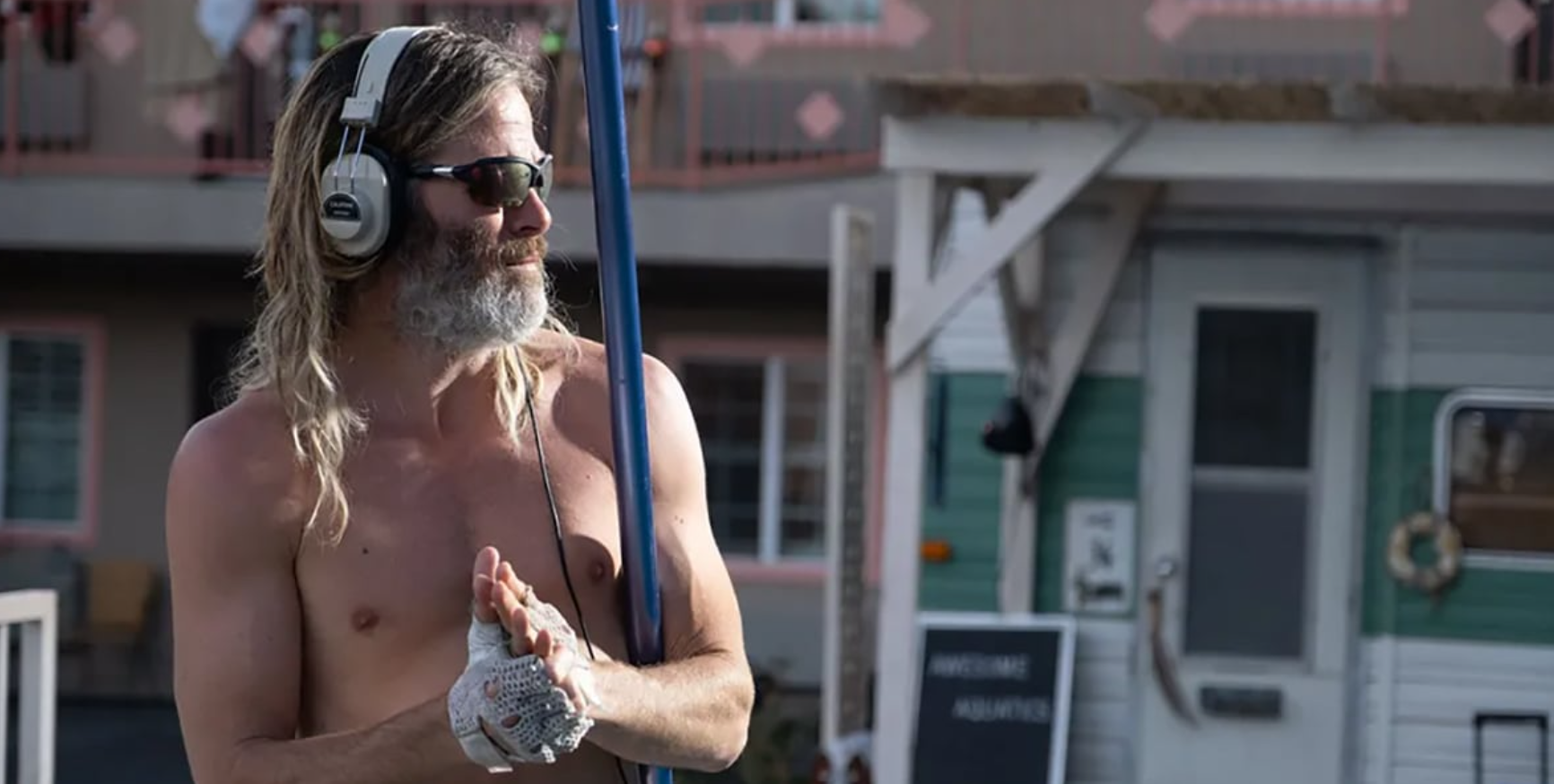TIFF Review: Chris Pine’s Poolman



Chris Pine’s directorial debut, Poolman, is, to put it nicely, a kooky love letter to Los Angeles with a neo-noir flair. There is a lot of energy on display in Poolman; there is not, however, any focus or successful management of tone. Swinging from hipster homage of bygone eras to earnest explorations of mental health in an urban landscape that challenges even the most passionate citizens to keep their heads above water, Poolman lacks, well, direction. Pine manages his cameras well enough, and the artistic design of Poolman is a vintage lover’s dream (the art direction is by Sammi Wallschlaeger, production design by Erin Magill, set decoration by Traci Spadorcia, and costumes by Cindy Evans), but as an actual story, Poolman offers nothing more than riffs on other (better) movies.
Pine stars as Darren, a middle-aged burnout working as a poolman at the Tahitian Tiki Apartments, one of those courtyard apartment buildings common to Los Angeles’s neighborhoods, though this one is, befittingly, worn down. Darren carefully maintains the pool, clocking the ever-lowering waterline, and in between bouts of therapy, sex with Susan (Jennifer Jason Leigh), and his artistic pool maintenance ritual, he attends city council meetings to hound the council president, Stephen Toronkowski (Stephen Tobolowsky), about the bus schedule and adding trolleys—red ones—to the city’s public transit.
One gets the feeling that Chris Pine, a native Angeleno, is actually very concerned with the state of public transit in the city (abysmal), and the paving over of so many historical monuments and architecturally significant buildings in the city (good timing, given the recent dust up over the fate of Marilyn Monroe’s house). Poolman is full of references to Los Angeles institutions like Langer’s Delicatessen and the architecture of Wallace Neff, but it begs the question of who cares, outside of other people interested in mass transit and cultural preservation. Lacking a connection to Los Angeles or those interests, there is little in Poolman to capture the viewer’s attention.
David Robert Mitchell’s 2018 film Under The Silverlake has a similar Angeleno-centric perspective and neo-noir feel, but it hooks the outside LA audience with actual jokes and a good mystery (one so good, people are still convinced the secret messages in the movie are real). Poolman, though, fails at every attempt at humor. Danny DeVito and Annette Bening star as Darren’s surrogate parents, Jack and Diane, who do a kind of rapid-fire Archie and Edith routine, but they are grating and obnoxious, rather than funny. Similarly, a running gag about Susan falling for other men falls flat, and the presence of various spies and goons doesn’t lead to any sort of comedic bit.
It's like Poolman is supposed to be a comedy, but Pine and co-writer Ian Gotler forgot to insert any jokes. And then other things that shouldn’t be funny are played for laughs, such as Darren writing daily, journal-esque letters to Erin Brockovich. This is just sad, though, deliberately revealing Darren’s questionable mental health, and maybe accidentally making him appear a bit stalkery (leave women you don’t know alone!). Poolman isn’t funny enough to work as a comedy, nor gonzo enough to work as a kind of trippy descent into the borderline seedy world of the regular people being pushed farther and farther to LA’s margins by constant development. It also fails as a mystery, because the plot is just a blatant cribbing of Chinatown, which the film at least has the grace to acknowledge.
The cast is good, and the performances fine, but every character is underwritten, except for Darren, who is just so messy that even Pine’s committed performance can’t overcome the lack of focus in the script. There is a genuinely good scene between Darren and Councilman Toronkowski late in the film that brings real humanity and empathy to these weirdo characters, but it’s too little too late in a film full of so much nonsense it deadens your ability to appreciate even the good bits, few though they are. Ray Wise, meanwhile, brings a Lynchian weirdness to his two scenes that everyone else would have been, er, wise to imitate.
It would be one thing if Poolman was an effective mystery, like Under The Silverlake and Chinatown, or an actual satire of Los Angeles, the way Hail, Caesar! is a satire of Hollywood, or just a f-cking weird ass film along the lines of Fear and Loathing in Las Vegas or Mulholland Drive. But it is none of these things, neither weird nor charming nor satirical or even just plain funny. It’s not even a good character study because Darren is halfway characterized as nothing more than a SoCal burnout, but also a damaged man who never got over his childhood. Pick one! Commit to the bit!
Visually, Chris Pine knew what he wanted to do, just as he knew how he wanted to play Darren, but narratively, Poolman’s script needed like, another year in drafts before being ready to film. It’s uneven, wildly veering between tones and ideas with zero clarity, adding up to nothing but a kind of stylish casserole of Things Chris Pine Likes. Glad you have hobbies, guy, but that’s not enough to justify a whole ass movie.
This review was published during the WGA and SAG-AFTRA strikes of 2023. The work being reviewed would not exist without the labor of writers and actors.

